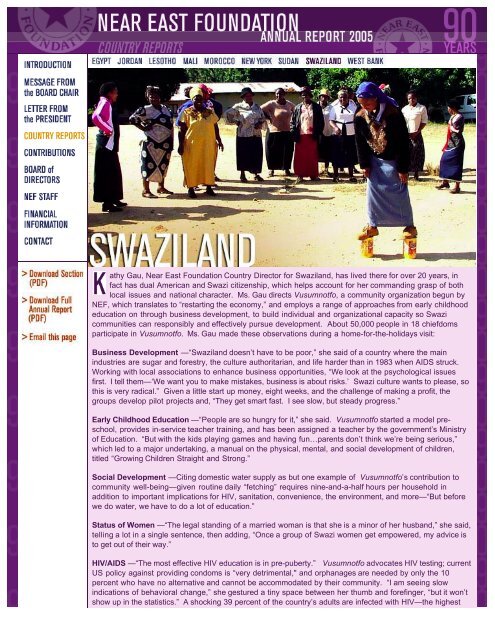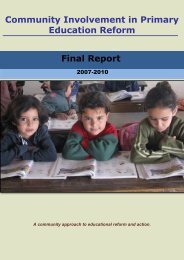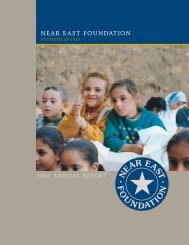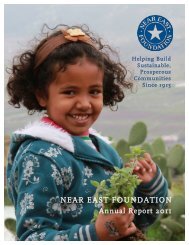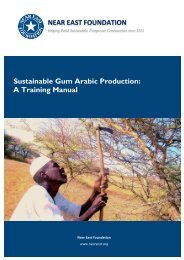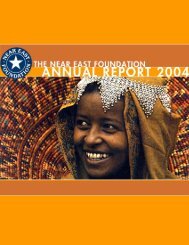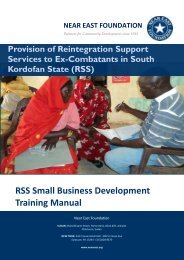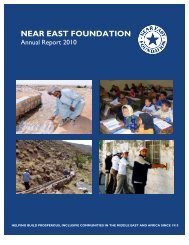NEF 2005 Annual Report - Near East Foundation
NEF 2005 Annual Report - Near East Foundation
NEF 2005 Annual Report - Near East Foundation
You also want an ePaper? Increase the reach of your titles
YUMPU automatically turns print PDFs into web optimized ePapers that Google loves.
athy Gau, <strong>Near</strong> <strong>East</strong> <strong>Foundation</strong> Country Director for Swaziland, has lived there for over 20 years, in<br />
fact has dual American and Swazi citizenship, which helps account for her commanding grasp of both<br />
local issues and national character. Ms. Gau directs Vusumnotfo, a community organization begun by<br />
<strong>NEF</strong>, which translates to “restarting the economy,” and employs a range of approaches from early childhood<br />
education on through business development, to build individual and organizational capacity so Swazi<br />
communities can responsibly and effectively pursue development. About 50,000 people in 18 chiefdoms<br />
participate in Vusumnotfo. Ms. Gau made these observations during a home-for-the-holidays visit:<br />
Business Development —“Swaziland doesn’t have to be poor,” she said of a country where the main<br />
industries are sugar and forestry, the culture authoritarian, and life harder than in 1983 when AIDS struck.<br />
Working with local associations to enhance business opportunities, “We look at the psychological issues<br />
first. I tell them—‘We want you to make mistakes, business is about risks.’ Swazi culture wants to please, so<br />
this is very radical.” Given a little start up money, eight weeks, and the challenge of making a profit, the<br />
groups develop pilot projects and, “They get smart fast. I see slow, but steady progress.”<br />
Early Childhood Education —“People are so hungry for it,” she said. Vusumnotfo started a model preschool,<br />
provides in-service teacher training, and has been assigned a teacher by the government’s Ministry<br />
of Education. “But with the kids playing games and having fun…parents don’t think we’re being serious,”<br />
which led to a major undertaking, a manual on the physical, mental, and social development of children,<br />
titled “Growing Children Straight and Strong.”<br />
Social Development —Citing domestic water supply as but one example of Vusumnotfo’s contribution to<br />
community well-being—given routine daily “fetching” requires nine-and-a-half hours per household in<br />
addition to important implications for HIV, sanitation, convenience, the environment, and more—“But before<br />
we do water, we have to do a lot of education.”<br />
Status of Women —“The legal standing of a married woman is that she is a minor of her husband,” she said,<br />
telling a lot in a single sentence, then adding, “Once a group of Swazi women get empowered, my advice is<br />
to get out of their way.”<br />
HIV/AIDS —“The most effective HIV education is in pre-puberty.” Vusumnotfo advocates HIV testing; current<br />
US policy against providing condoms is “very detrimental," and orphanages are needed by only the 10<br />
percent who have no alternative and cannot be accommodated by their community. “I am seeing slow<br />
indications of behavioral change,” she gestured a tiny space between her thumb and forefinger, “but it won’t<br />
show up in the statistics.” A shocking 39 percent of the country’s adults are infected with HIV—the highest


